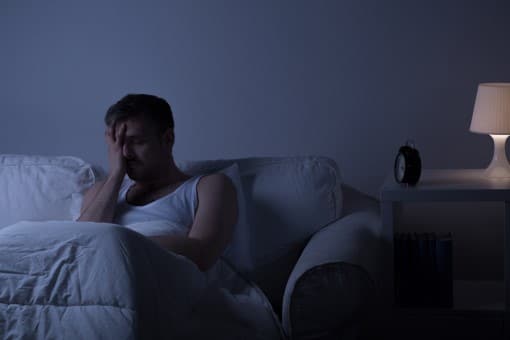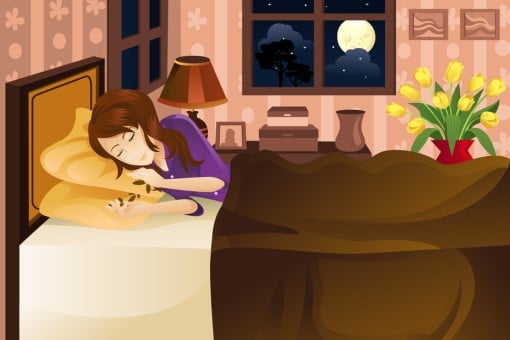
10 home remedies worth a try if shoulder pain is keeping you from sleeping on your side
By Jason Wooden, PhD | June 9, 2020
If you’re frustrated shoulder pain is keeping you from sleeping on your side, you’re not alone. It’s a big problem for anyone who can only get quality sleep in this position.
There are many causes for shoulder pain and reasons why it gets worse at night. Whether you’re sleeping on your side to prevent snoring or to keep your sleep apnea under control, there’s a wide variety of home remedies that help with nagging shoulder pain.

Why shoulder pain is extra trouble for side sleepers
If shoulder pain is keeping you from sleeping on your side, welcome to the club.
I’m a side sleeper too and when I started having shoulder issues it quickly wrecked my nights before I figured out what to do.
Things are more manageable these days but it was a rough ride along the way.
Did you know 20% of the world’s population deal with chronic pain every day and many struggle with insomnia?
And that sleeping on your side is the most common position?
With numbers like that, you can see that you’re likely not the only whose shoulder pain is keeping them up at night.
Nighttime pain can make it harder to fall asleep and to stay asleep. It can also keep you out of the deep restorative REM sleep that sleep experts say you need to wake up feeling refreshed.
So, any pain is an issue for sleep, but shoulder pain is extra trouble for the millions of people who have to sleep on their side.
For some, sleeping on their side is the only way to keep their snoring from waking up themselves and a bedmate.
It’s also the preferred sleep position for many sleep apnea patients as it helps keep their symptoms under control. (Sleep apnea is one of the most common sleep disorders and it’s a major sleep wrecker.)
Is this your situation?
Maybe you’ve tried to sleep on your back but you still end up your side…
Regardless, we’re going to talk about what you can do to get out of the shoulder pain club so that you get the sleep you desperately need.

What causes shoulder pain?
If shoulder pain is keeping you from sleeping on your side, there are many different causes.
The most common causes are:
Bursitis – inflammation of the fluid-filled pads that cushion joints
Tendonitis – inflammation of the tendons that connect muscle to bone
Rotator cuff injuries – inflammation of damaged muscles and tendons that connect the upper arm to the shoulder blade
However, there are any number of other things that can cause or aggravate shoulder pain:
- arthritis in a shoulder joint
- bone spurs
- broken shoulder bone
- dislocated shoulder
- frozen shoulder (stiff muscles, tendons, and ligaments)
- poor posture
If you’re not sure what causing your shoulder pain, a doctor can help you figure it out.

If shoulder pain is keeping you from sleeping on your side, there’s a reason it’s worse at night
Have you found that your shoulder pain is manageable during the day but as soon as you hit the sack for the night things get worse?
During the day, you and your shoulder are more active. There’s more blood flow and oxygen which helps relieve stiffness and pain.
The night is a different story.
The fact that you’re moving less means fluids can settle and lead to inflammation.
When you lay down, gravity causes muscles and tendons in the shoulder to settle in a different position which decreases blood flow and can aggravate an injury.
Lying on your shoulder can also aggravate an injured area causing more inflammation.
That’s a lot going on that can make it harder to fall asleep.

Home remedies for when shoulder pain is keeping you from sleeping on your side
Now we finally get to what you really want to know – all the things you can try at home when your shoulder pain is keeping you from sleeping on your side.
Depending on the severity of your symptoms, you have a variety of options:
1) Pain meds
Obviously, this is usually the first thing people try.
Your choices include anti-inflammatory and anti-pain over the counter pain meds such as acetaminophen (Tylenol), ibuprofen, or naproxen. With a doctor’s prescription you can get some of the more powerful opioid medications.
Pain meds do come with downsides. Pain meds can make it harder for some people to get sleep.
Also, opioids are pretty addictive and over time you may need increasingly higher amounts to get the same effect.
Learn more:
Pain medications
What to do when if your pain med is keeping you awake
2) Sleep on the other side
Okay, this one is obvious too. If one shoulder hurts when sleeping, try laying on the other side.
If you’ve tried this but found that you move too much while asleep, try building a wall with pillows to prevent rolling over onto the injured shoulder while asleep
3) Try sleeping up right
Sleeping upright might help relieve some of the pressure on your shoulder since there’s less direct weight on it. If you’re worried that this might aggravate your sleep apnea, recent research has shown that elevating the head can help keep sleep apnea symptoms under control.
You can try a recliner, an adjustable bed, or wedge pillow.
4) Try a different mattress and pillow
If you can afford it, this one is worth a try. A high quality memory foam mattress can help relieve the pressure the body puts on a shoulder when your sleeping on your side.
A pillow that provides proper support for your head and body can also help relieve pressure on the shoulder.
5) Change what you do
You may find it helpful to make some changes to daytime activities you find aggravate your shoulder pain. Your options include pacing yourself, making minor changes to what you do, or completely taking a break.
6) Shoulder exercises
Light stretching in the evening can increase flexibility and blood flow which can help relieve shoulder pain when you lay down. Stretching can also help fight stress and tension built up during the day which can also be beneficial for your shoulder.
Learn more:
Top 10 exercises to relieve shoulder pain (Healthline)
15 simple stretches for tight shoulders (Greatist.com)
7) Try an ice pack
Cold can help numb pain, fight inflammation, and reduce swelling. For some it’s enough temporary relief they can at least fall asleep. You can try putting ice on your shoulder for 15 minutes.
8) Try heat
Heat can relax muscles and open up blood vessels. This can help the body’s healing process and provide some pain relief. You can try a warm shower or a heat pack.
9) Physical activity
Surprisingly, studies have found that exercise can help people manage their pain. Gentle activities such as walking or swimming can help improve your pain threshold.
Learn more
Pain and physical activity
Exercising To Ease Pain: Brisk Walks Can Help
10) Try massage
Massage can help relieve pain through relaxing the shoulder, reducing stress, and overriding pain signals. Try having someone GENTLY knead the area that’s sore. Even better, you can hire an in home massage therapist.
If you feel your at home massage is causing more pain or aggravating an injury, you should stop. There may be something more serious going on which needs to be looked at by a doctor.
Learn more:
How massage therapy helps shoulder pain
When is Massage right for shoulder pain?

Know when it’s time to see a doctor
If shoulder pain is keeping you from sleeping on your side and it’s ongoing, it’s a good idea to see a doctor.
When your pain and poor sleep have become a fact of life it’s time to get help.
Especially if you really don’t know what’s causing your pain and it’s worsening…
There may be something more serious than you think going on.
Another reason to see a doctor sooner rather than later is to avoid getting into a downward spiral of poor sleep and pain:
Did you know that insomnia can actually make pain worse?
It can lower your pain threshold and tolerance which results in an awful cycle – pain causes insomnia and insomnia causes more pain.
According to the US National Institutes of Health, you should seek medical help if:
- shoulder pain with a fever, swelling, or redness
- problems moving the shoulder
- pain for more than 2 to 4 weeks, even after home treatment
- swelling of the shoulder
- red or blue color of the skin of the shoulder area
A doctor can order special tests to help figure out what’s going on. An x-ray can identify structural issues such as bone fractures or arthritis. An MRI can show what’s happening to the bones and soft tissue, such as the muscles and tendons.
Depending on what they find, they may recommend:
- anti-inflammatory medications
- steroid injections
- physical therapy
- massage therapy
- chiropractic treatment
- acupuncture
- surgery
Learn more:
Shoulder pain diagnosis symptom checker
What Your Doctor Can See with a Shoulder MRI

Other things you should be doing for your sleep
Other things you should be doing for your sleep
Did you know that there are many different things that can make your insomnia worse?
Shoulder pain is bad enough for sleep by itself.
Make sure you’re practicing good sleep hygiene, the everyday things that set the stage for deep restful sleep:
For better sleep hygiene, sleep experts suggest you:
- Keep consistent wake up & sleep times
- Avoid naps
- Exercise during the day
- Avoid large meals, alcohol, or stimulants such as caffeine before bedtime
- Maintain a regular bedtime routine
- Avoid using TVs, laptops, or other electronics before sleep
- Keep your bedroom dark, cool, quiet, & relaxing
You should get a check up with a doctor since many other health issues besides pain are linked to poor sleep, including diabetes, asthma, heart disease, and mood disorders.
You may also be walking around with an undiagnosed sleep disorder like sleep apnea.
Pain management and sleep hygiene won’t resolve these underlying issues.
Finally, keep in mind that poor sleep can worsen inflammation.
So, if shoulder pain is keeping you from sleeping on your side, it’s important you’re doing everything you can to give yourself the best chance for quality sleep every night.
Sources:
1. 27 Chronic Pain Statistics Everyone Should Know”, 2020, DisturbMeNot website
2. Insomnia Co-Occurring with Chronic Pain: Clinical Features, Interaction, Assessments and Possible Interventions, Rev Pain. 2008 Sep; 2(1): 2–7.
3. Chronic Pain and Sleep Disorders in Primary Care, Pain Res Treat. 2017
4. Sleep positions and nocturnal body movements based on free-living accelerometer recordings: association with demographics, lifestyle, and insomnia symptoms, Nat Sci Sleep. 2017; 9: 267–275.
5. Shoulder pain, MedlinePlus website
6. “Why Is My Shoulder Pain Worse at Night?”, 2019, Orthopaedic Associates of Central Maryland website
Connect with us:
About Us
Better Sleep Simplified® was founded as a place for you to get clear and well-researched information.
Our goal is to make sure you know about your options so that you take action sooner rather than later.
Check us out on YouTube:
Watch and Learn
Helpful sleep tips, interesting sleep facts and statistics you want to know about
Affiliate Disclosure
This site is a participant in the Amazon Services LLC Associates Program and other affiliate advertising programs designed to provide a means for sites to earn advertising fees by advertising and linking to them.
Important: BetterSleepSimplified.com is for informational purposes only and is not intended or implied to be a substitute for professional medical advice, diagnosis, or treatment. Always consult a physician for sleep and health concerns. See additional information.
